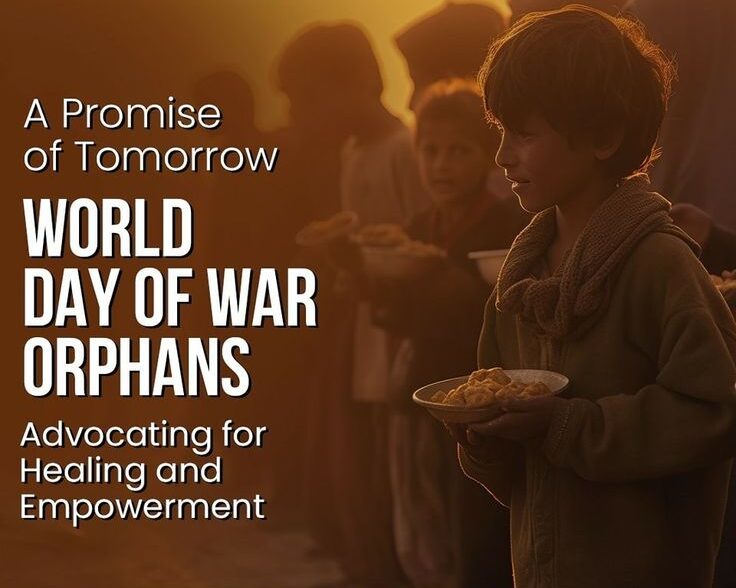🧭 Introduction: A Silent Cry That Must Be Heard
Every war leaves behind countless victims. But among the most vulnerable and often forgotten are war orphans.
- 📜 History of World Day for War Orphans
- 📅 Timeline: Key Milestones and Global Relevance
- 🧠 9 Devastating Facts About War Orphans
- ❓ Frequently Asked Questions (FAQs)
- 1. Why is World Day for War Orphans observed on January 6?
- 2. How many war orphans exist globally?
- 3. What challenges do war orphans face?
- 4. How can people help?
- 5. Are there any global initiatives supporting them?
- ✨ Significance of the Day
- 🎯 Important Observance Practices
- 💬 Wishing Messages to Spread Awareness
- 🧩 Key Points to Remember
- 🧬 Importance in Daily Life
- 🌍 Societal Impact
- 🧘♀️ Conclusion: Their Silence Speaks Volumes—Will We Listen?
World Day for War Orphans, observed annually on January 6, is a poignant reminder of the children who lose their parents to the horrors of war. These are not just statistics—they are real human beings, struggling to survive and be heard.
This day calls upon global society to take responsibility—not only for what war destroys but for what humanity must rebuild. Let’s explore the history, significance, facts, FAQs, and impact of this important observance.
📜 History of World Day for War Orphans
The World Day for War Orphans was initiated by the French organization SOS Enfants en Détresse (Children in Distress) with the intention of raising awareness about the plight of children orphaned due to wars and armed conflicts around the world.
Although it isn’t an official United Nations day, its significance is global. The purpose of this observance is to highlight the dire conditions faced by millions of children across war-affected regions like Syria, Afghanistan, Ukraine, Palestine, Sudan, and others.
War orphans often suffer from:
Poverty
Displacement
Lack of education
Psychological trauma
Exploitation and abuse
This day aims to amplify their silent struggles and promote initiatives that restore their right to safety, family, love, and education.
📅 Timeline: Key Milestones and Global Relevance
| Year | Milestone |
|---|---|
| Post WWII (1945+) | Millions of war orphans left homeless in Europe, Asia |
| 1989 | UN Convention on the Rights of the Child is adopted |
| Early 2000s | SOS Enfants en Détresse institutes World Day for War Orphans |
| 2010s | Rise in awareness due to Syria, Yemen, Sudan conflicts |
| 2020s | Wars in Ukraine and Gaza bring renewed attention |
| 2025 | Increased global campaigns for war orphan education and rehabilitation |
🧠 9 Devastating Facts About War Orphans
Over 140 million children worldwide are orphans, and a significant portion have lost their parents due to armed conflicts.
In Syria alone, over 1 million children are considered orphans as of recent reports.
War orphans are 10 times more likely to be trafficked or recruited as child soldiers.
Most do not have access to formal education or basic healthcare.
Many war orphans suffer from untreated PTSD, anxiety, and depression.
Statelessness is a common issue, making them legally invisible.
Girls are at extremely high risk of early marriage, abuse, and neglect.
Social stigma and isolation often haunt them long after the war ends.
Humanitarian funding for war orphan relief remains critically low in conflict zones.
❓ Frequently Asked Questions (FAQs)
1. Why is World Day for War Orphans observed on January 6?
It was established by SOS Enfants en Détresse to bring international attention to war orphans, though not yet recognized by the UN.
2. How many war orphans exist globally?
While numbers vary, estimates suggest tens of millions of children have lost parents due to war since WWII.
3. What challenges do war orphans face?
Lack of shelter and food
No access to schooling
Exploitation and recruitment
Emotional and psychological trauma
4. How can people help?
Support organizations offering:
Education and shelter
Mental health support
Advocacy and protection programs
5. Are there any global initiatives supporting them?
Yes. Agencies like UNICEF, Save the Children, and War Child have active campaigns for war orphans and displaced youth.
✨ Significance of the Day
World Day for War Orphans is significant because it:
👁️🗨️ Raises Awareness
Shines a light on an often-overlooked consequence of war—the silent suffering of children who lose their parents and guardians.
🤝 Encourages Global Action
Pushes governments, NGOs, and individuals to come together to provide protection, education, and legal support to orphans.
🧠 Mental Health Focus
Stresses the need for trauma-informed care, psychological assistance, and rehabilitation programs for long-term healing.
🕊️ Advocates for Peace
Highlights the human cost of war, encouraging movements toward peaceful resolution and conflict prevention.
🎯 Important Observance Practices
Across the world, the day is marked with:
Candlelight vigils and silent marches in memory of war orphans
Awareness campaigns and documentaries on the plight of children in conflict zones
Donation drives for orphanages and child welfare NGOs
Social media movements using hashtags like
#WorldDayForWarOrphans,#EveryChildMatters, and#NoMoreWarLetters and artwork by children for peace and hope
💬 Wishing Messages to Spread Awareness
✨ “Let’s be the family for those who lost theirs to war. Raise your voice for war orphans today.”
🕊️ “Every orphan of war deserves a life of peace, love, and protection. Let us make it possible.”
💔 “Not all scars of war are visible—some are hidden in the eyes of orphans. Let’s heal them with action.”
🌍 “The world is their home now. Let’s make it safe, kind, and hopeful.”
🧩 Key Points to Remember
Observed every year on January 6.
Focuses on children who lose parents due to war.
Initiated by SOS Enfants en Détresse (France).
Over tens of millions of children globally are affected.
Day highlights the need for education, legal identity, mental health, and emotional care.
Supported by NGOs like UNICEF, Save the Children, War Child, and more.
🧬 Importance in Daily Life
🧠 Cultivating Empathy
World Day for War Orphans reminds us of the power of empathy in a violent world. Understanding the struggles of war orphans helps build a kinder, more compassionate society.
🏫 Education for Action
In schools and colleges, this day can be used to educate the youth on global issues, encouraging volunteering, donations, or even careers in child welfare and human rights.
🤝 A Global Responsibility
Whether we’re individuals, educators, or professionals—this day compels us to ask: What can I do to make even one orphan’s life better?
🌍 Societal Impact
Human Rights Protection: Reinforces the UN Convention on the Rights of the Child, pushing for accountability in conflict zones.
Peace Advocacy: Exposes the long-term consequences of war, beyond just politics and military casualties.
Policy Formation: Encourages better refugee and child protection laws, especially in war-affected countries.
Cross-border Collaboration: Stimulates global humanitarian cooperation, which is crucial for sustainable development and peace.
🧘♀️ Conclusion: Their Silence Speaks Volumes—Will We Listen?
The World Day for War Orphans is not just about remembrance—it’s about responsibility, resilience, and rebuilding. These children, though orphaned by violence, should not be orphaned by humanity.
Their trauma may be invisible, but the weight they carry is heavier than most of us can imagine.
Let this day be a call to conscience, a spark of activism, and a reminder that love, shelter, and dignity are not privileges—they are rights.








